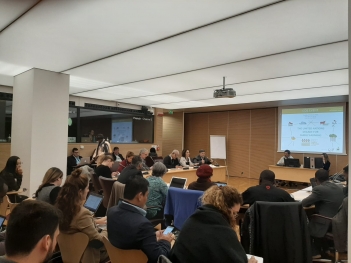In the framework of the Farmers’ Forum, family farming organizations called for IFAD’s strong involvement in the United Nations Decade of Family Farming.
Rome, 14 February 2020 – Family farming organizations from around the world met at the Farmers’ Forum (FAFO 2020) organized by IFAD from 6 to 11 February in Rome. It was a space that was, without a doubt, a very appropriate opportunity to demonstrate the commitment of hundreds of family farming organizations to implement the United Nations Decade of Family Farming 2019-2028 (UNDFF), and to ask IFAD to continue strongly supporting this process of strengthening family farmers.
In fact, the final Declaration of the Farmers’ Forum, presented to IFAD’s Governing Council, includes many of the proposals made by the family farming organizations that participated in the event, among them those based on the implementation of the UNDFF.
In this sense, the final document requests IFAD to provide its financial and technical support for the establishment ofNational Committees of Family Farming (NCFF), led by family farming organizations.
It also recommends that IFAD promote multi-stakeholder processes for the implementation, monitoring and evaluation of the UNDFF and work with governments to ensure that national and regional policies on family farming and rural development are consistent with the guidelines and principles derived from the Decade.
It should be noted that the Global Action Plan of the Decade establishes, by 2024, the goal of 7 subregional Action Plans, 5 regional and 100 National Action Plans by 2024, with measures, policies and commitments in favour of family farming, developed by governments in dialogue with family farming organizations and/or National Committees for Family Farming. It is therefore very important to recognize, strengthen and support the National Committees for Family Farming (led mainly by farmers organizations), as well as other existing spaces for policy dialogue. These are key to the successful implementation of the UNDFF and to the establishment of comprehensive and coherent policies, investments and institutional frameworks in the different territories.
The FAFO recommendations document, which was shared with IFAD’s Governing Council and will be made public soon, also contains important recommendations based on key issues such as rural youth, gender and leadership of women’s organizations, climate change, and the United Nations Decade of Family Farming.
SUCCESSFUL SIDE EVENT ON THE UNDFF
As a final touch to the Farmers’ Forum, a side event was held on 11 February, coordinated by COPROFAM and the World Rural Forum (WRF), dedicated to the United Nations Decade of Family Farming, with the aim of presenting the challenges, proposals and initiatives of the organizations to implement the Global Action Plan of the UNDFF and make recommendations that can be included in the IFADs Work Plan.
It was an event that brought together many family farming organizations, National Committees of Family Farming and representatives from FAO and IFAD.
It highlighted the many processes already under way to implement the Decade at the national, regional and global levels and the commitment that various actors, such as IFAD, FAO and ILC, have shown. But it was also pointed out that for the Decade to meet its ambitious goals by generating a positive, large-scale impact on the lives of millions of family farmers, equally ambitious financial resources are absolutely necessary.
The Decade must generate new commitments from governments in terms of public policies for family farming.
It is also essential to increase communication efforts, and to broaden the mobilization of the various actors at the country level. The involvement of the national offices of FAO and IFAD in facilitating and supporting the ongoing processes of creating national and regional Action Plans for the Decade, supporting National Committees of Family Farming, and incorporating the Decade into their Country Strategic Opportunities Programme (COSOP) and Country Programming Framework, respectively, was widely requested.
More information:



